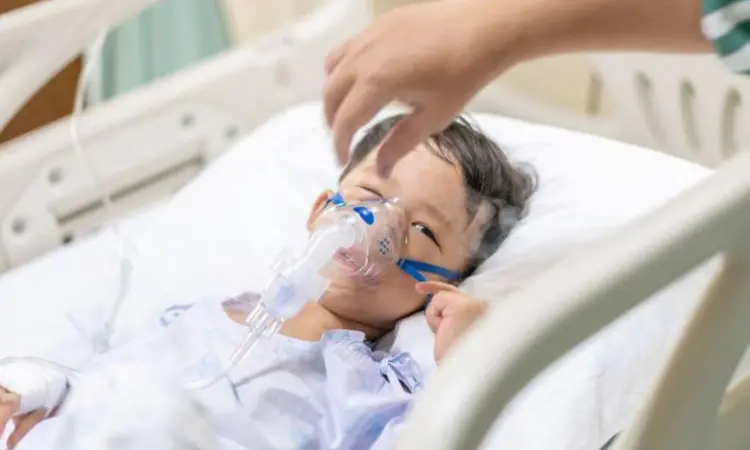- Home
- Medical news & Guidelines
- Anesthesiology
- Cardiology and CTVS
- Critical Care
- Dentistry
- Dermatology
- Diabetes and Endocrinology
- ENT
- Gastroenterology
- Medicine
- Nephrology
- Neurology
- Obstretics-Gynaecology
- Oncology
- Ophthalmology
- Orthopaedics
- Pediatrics-Neonatology
- Psychiatry
- Pulmonology
- Radiology
- Surgery
- Urology
- Laboratory Medicine
- Diet
- Nursing
- Paramedical
- Physiotherapy
- Health news
- Fact Check
- Bone Health Fact Check
- Brain Health Fact Check
- Cancer Related Fact Check
- Child Care Fact Check
- Dental and oral health fact check
- Diabetes and metabolic health fact check
- Diet and Nutrition Fact Check
- Eye and ENT Care Fact Check
- Fitness fact check
- Gut health fact check
- Heart health fact check
- Kidney health fact check
- Medical education fact check
- Men's health fact check
- Respiratory fact check
- Skin and hair care fact check
- Vaccine and Immunization fact check
- Women's health fact check
- AYUSH
- State News
- Andaman and Nicobar Islands
- Andhra Pradesh
- Arunachal Pradesh
- Assam
- Bihar
- Chandigarh
- Chattisgarh
- Dadra and Nagar Haveli
- Daman and Diu
- Delhi
- Goa
- Gujarat
- Haryana
- Himachal Pradesh
- Jammu & Kashmir
- Jharkhand
- Karnataka
- Kerala
- Ladakh
- Lakshadweep
- Madhya Pradesh
- Maharashtra
- Manipur
- Meghalaya
- Mizoram
- Nagaland
- Odisha
- Puducherry
- Punjab
- Rajasthan
- Sikkim
- Tamil Nadu
- Telangana
- Tripura
- Uttar Pradesh
- Uttrakhand
- West Bengal
- Medical Education
- Industry
Aminophylline therapy improves urine output, useful as adjunct diuretic in children with AKI

Africa: A recent study published in Pediatric Nephrology found an increase in urine output among critically ill children with acute kidney injury (AKI) after aminophylline therapy.
The study of children around three months of age with more than half of them being females found a significant increase in urine output six and twenty-four hours following aminophylline therapy. There was a significant variation in this change in urine output across the age groups with time after controlling for participant characteristics including inotrope use.
The researchers found no statistically significant change in serum creatine post-aminophylline therapy but with significant age-related variation in serum creatinine with time.
Acute kidney injury is reported to be a frequent complication of children admitted to the pediatric ICU (intensive care unit). One key management modality of AKI is diuretics use to reduce fluid overload.
Aminophylline is a drug well known for its use in the treatment of bronchial asthma. However, it is also purported to have diuretic effects on the kidneys. Beatrice I. Nyann, University of Ghana Medical Centre, Legon, Accra, Ghana, and colleagues aimed to assess the effect of aminophylline in critically ill children with AKI in a retrospective cohort study.
For this purpose, the researchers conducted a retrospective chart review of children admitted to the paediatric ICU of the Red Cross War Memorial Children’s Hospital (RCWMCH) with acute kidney injury who received aminophylline (from 2012 to June 2018). Data captured and analyzed included underlying disease conditions, demographics, urine output, medications, fluid balance, and kidney function. Data analysis was done from thirty-four children.
The study revealed the following findings:
- There was an increase in urine output from a median of 0.4 mls/kg/hr at six hours before aminophylline administration to 0.6 mls/kg/hr at six hours and 1.6 mls/kg/hr at twenty-four hours post aminophylline therapy.
- The median urine output significantly varied across the age groups over the 24-h time period post-aminophylline, with the most response in the neonates.
- There was no significant change in serum creatinine levels six hours post-aminophylline administration [109—125.5 micromole/l].
- There were significant age-related changes in creatinine levels at six hours post-aminophylline therapy.
"Our study revealed an improvement in urine output with aminophylline therapy. However, we did not find any significant effect on serum creatinine levels with aminophylline use," the researchers wrote. "In the neonatal group, the effect of augmentation of urine output was more pronounced."
"There is a need for further studies to justify these findings due to the study's uncontrolled nature and small sample size," they concluded. "Despite these limitations, aminophylline should be considered as an adjunct diuretic in children with AKI."
Reference:
Nyann, B.I., Nourse, P., Masu, A. et al. Effects of aminophylline therapy on urine output and kidney function in children with acute kidney injury. Pediatr Nephrol (2023). https://doi.org/10.1007/s00467-023-06065-y
Dr Kamal Kant Kohli-MBBS, DTCD- a chest specialist with more than 30 years of practice and a flair for writing clinical articles, Dr Kamal Kant Kohli joined Medical Dialogues as a Chief Editor of Medical News. Besides writing articles, as an editor, he proofreads and verifies all the medical content published on Medical Dialogues including those coming from journals, studies,medical conferences,guidelines etc. Email: drkohli@medicaldialogues.in. Contact no. 011-43720751


